Jack draws his birdhouse.
[draws [Jack] [birdhouse [his]]]
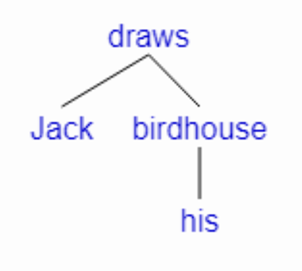
They build it together.
‘Together’ is an adverb modifying ‘build’. How did ‘they build it’? ‘together’.
[build [They] [together] [it]]
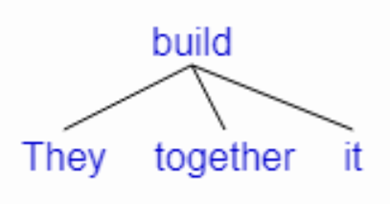
Jack draws his birdhouse.
[draws [Jack] [birdhouse [his]]]

They build it together.
‘Together’ is an adverb modifying ‘build’. How did ‘they build it’? ‘together’.
[build [They] [together] [it]]

I’m not confident about this one.
Then they hang it up in a tree.
‘Then’ is an adverb modifying ‘hang’.
‘Up’ is an adverb modifying ‘hang’.
The prepositional phrase ‘in a tree’ is an adverb modifying ‘hang’.
[hang [they] [Then] [up] [it] [in [tree [a]]]]
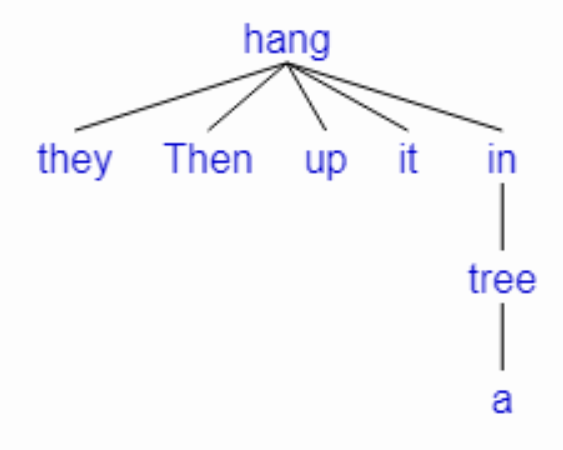
My first guess was “in a tree” tells us where “up” is rather than directly telling us where the hanging happens. It seems kinda ambiguous and contextual though. I can see it working both ways.
For child order, I put modifiers last so the object (or complement) has a consistent position (second).
How do you rule out that the prepositional phrase ‘in a tree’ is a adjective modifying ‘it’? The prepositional phrase would be telling you the location of ‘it’.
It kind of intuitively sounds better that ‘in a tree’ tells you where ‘it’ is hanging but I can’t say definitively why.
Is there any ambiguity with ‘then’? Could ‘then’ be modifying the whole sentence? Is that an important distinction?
By meaning not grammar. Compare with:
“I like the man in the building.”
What does “in the building” modify? Man not like. How do I know? The meaning makes more sense that way. If I wanted to say I like the man and I’m doing that liking in the building, I’d word it differently. Like “While I’m in the building, I like the man”.
A prepositional phrase in that position can modify the verb’s object.
But for “Then they hang it up in a tree.” if you meant “Then they hang up the one that is (already) in a tree” you’d word it differently to get that meaning across, like I just did. Or like, awkwardly, “Then they hang the in-a-tree it up”. Otherwise there’s no way to tell that “in a tree” is meant to tell us which “it” rather than where the hanging or up is.
Your intuition can answer a lot of questions like this for you. If it doesn’t tell you right away, you can try asking it more questions. Ask about related or similar sentences, simpler versions, versions where your intuition gives a different answer (like my man and building example), etc. Quizzing your intuition in a bunch of different ways can draw more information out of it and give you more confidence about what it says and what the boundaries are for when it will instead say something different.
Is there any ambiguity with ‘then’? Could ‘then’ be modifying the whole sentence? Is that an important distinction?
In general, I wouldn’t worry about “modifies the verb (that leads the clause)” vs. “modifies the clause”.
Does the problem with ‘in a tree’ modifying ‘it’ have to do with ‘it’ being a pronoun? As I was just thinking about this it seems like adjective prepositions tell you which one of something. As in, they specify that it was the ‘man in the tree’ or the ‘squirrel in the tree’. With a pronoun you have already referenced which one you are talking about so it doesn’t make sense add a qualifying adjective.
Base on your reply, I think I could try using a procedure like the one below, to match modifiers with things-being-modified (is there a word for this?):
Guessing at modifier grammar:
Thank you for finding this.
I like the word modificand that is linked to in the first reply there:
I thought ‘target’ also seemed pretty good. Its a way more normal word than modificand. ‘Target’ sounds like something that is receiving modification but might also be unclear in usage.
A bird goes into the bird house.
The prepositional phrase ‘into the bird house’ modifies ‘goes’. It tells you where the bird goes; ‘into the bird house’.
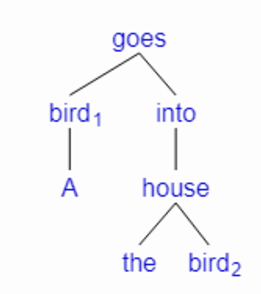
A second bird goes in.
‘A’ is a determiner/adjective that modifies ‘bird’. It tells you that this is a single bird that has not already been identified.
‘Second’ is an adjective modifying ‘bird’. It tells you what order this bird came in at.
[goes [bird [A] [second]] [in]]
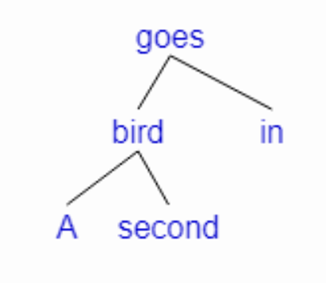
I had to look stuff up about ‘a’ as a determiner for this one. I kind of think that ‘a’ could be an adverb modifying ‘second’. It’s a bit hard to tell for me. This took like 10 minutes.
Jack and his mom look at each other.
The prepositional phrase ‘at each other’ is an adverb that modifies ‘look’. It tells you where they look. ‘Each’ is an adjective/determiner modifying ‘other’.
Subject: ‘Jack and his mom’.
‘And’ is a conjunction joining the two parts of the compound subject.
‘His’ is a determiner/adjective that modifies ‘mom’. It tells you which mom Jack is looking with.
[look [and [Jack] [mom [his]]] [at [other [each]]]]
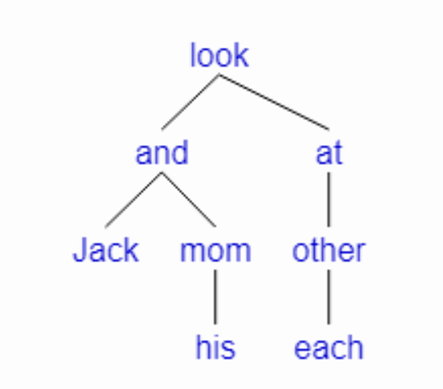
They need a bigger birdhouse!
[need [They] [birdhouse [a] [bigger]]]
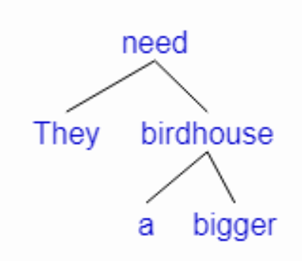
Looks like you’re generally getting these correct but aren’t enthusiastic about doing dozens of them. Maybe you’d find my grammar videos on the CF channel more fun to go through, even if you can’t do all the analysis yourself before seeing solutions. (Maybe put a time limit like 30min each, for the hard sentences, for trying to do them yourself unless you really want to go longer and you’re actively making progress).
[like [I] [“to read” [books [comic]]]]
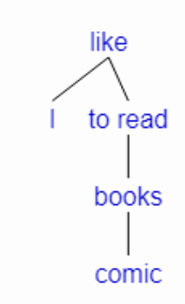
“To read” is an infinitive that functions as the object of “like”.
“Books” is the object of the non-finite verb “to read”.
“Comic” is an adjective that modifies “books”.
[are [They] [fun [“to read”]]]
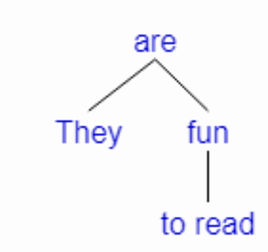
Linking verb: “are”.
Subject complement: “fun”
“To read” is an adjective that modifies “fun”. It tells you the way in which “they” are “fun”. It qualifies “fun” by restricting the aspect in which they are fun. Being “fun to read” is only one way something could be fun and it doesn’t say they are fun in general.
They make me smile.
Alternative 1:
[make [They] [me [smile]]]
“Me” is the object of “make”.
“Smile” is a bare infinitive, that functions as an adjective modifying “me”.
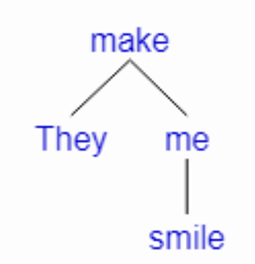
Alternative 2:
[make [They] [smile [me]]]
The infinitive “smile” is the object of “make”.
“Me” is the object of “smile”.
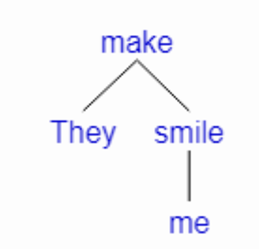
Brainstorm sentences:
I was made to smile.
They forced me to smile.
“To smile” seems related to “me”. I can’t tell whether “to smile” is modifying “me” or taking “me” as an object. When I think of “to smile” as a modifier, it seems like it could be modifying “forced”.
Who was “forced”? “Me” (object).
What action was “forced”? “To smile” (adverb).
What, conceptually, does an object mean? What would “me” being the object of “smile” mean?
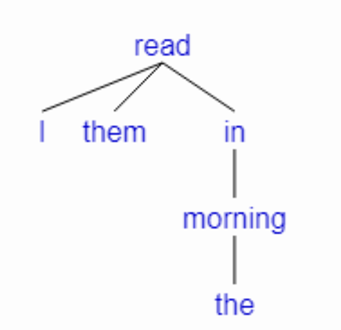
“In the morning” is a prepositional phrase that functions as an adverb, modifying “read”.
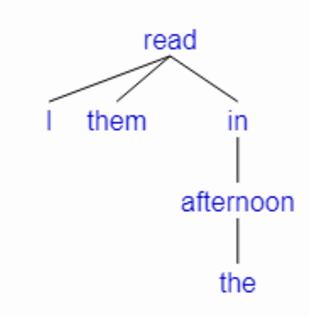
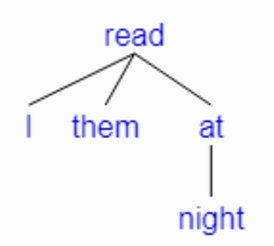
“At night” is a prepositional phrase that modifies the verb “read”.
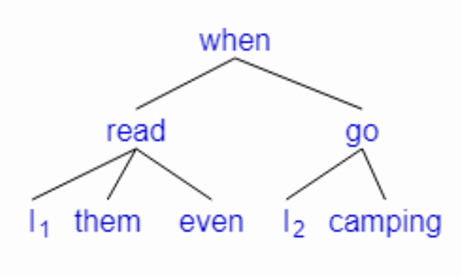
“Even” is an adverb that modifies “read”.
“When” is a subordinating conjunction. It says they read when they camp, not that they camp when they read.
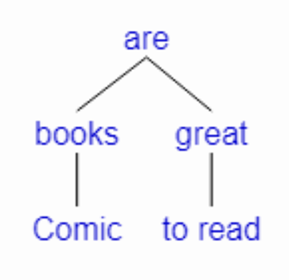
“To read” is an adjective that modifies “great”. It qualifies what is “great” about the “books”.
“Comic” is an adjective that modifies “books”.
What part of speech do you think “great” is?
I just went back and re-read the part of ET’s grammar article that talks about objects and complements. An object is a noun that is receiving the action of an action verb.
“Me” being the object of “smile” would mean that “me” receives the action of smiling. Put that way, it doesn’t sound right. “Me” is the one doing the smiling. So, I think I can kind of see why “me” can’t be the object of “smile”. And I think that means “me” must be the object of “make”.
The sentence “They make me”, it sounds like it’s saying that “me” was created(built/made/constructed) by “they”. So, adding “smile” seems to change the meaning of “make” in this sentence. That would indicate that “smile” is an adverb that modifies “make”. It tells you what “they make” happen to “me”.
Brainstorm sentence:
They make me run home.
Subject: They.
Action verb: make.
Object: me.
Non-finite verb: run.
Non-finite verb object: home.
Does that look right?
I was trying to brainstorm a sentence that really does have a non-finite verb with an object. In the brainstorm sentence “home” receives the action of “run”. It says where you “run”.
Brainstorm sentence 2:
They make me throw a ball.
Subject: They.
Action verb: make.
Object: me.
Non-finite verb: throw.
Non-finite verb object: ball.
“A” modifies “ball” (determiner).
In this sentence it looks clearer to me that “ball” is receiving the action of throwing.
Typing on phone not using quote marks.
Home is a special case. Don’t use it in examples. Note how you can’t replace it with library.
I think:
Me is the subject of smile and smile is the object of make.
Me is the subject of throw and throw is the object of make. Ball is the object of throw.
In general, if it seems like the make or other verb applies to the whole group, that can work by it applying to the nonfinite verb which then governs a subject and or object.